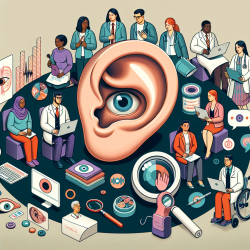Introduction
In the evolving landscape of clinical practice, particularly in the realm of speech-language pathology, understanding the definition of disability is crucial. The research article "Have We Loosened the Definition of Disability? The Effects of Changes in the Law and Its Interpretation on Clinical Practice" by Robert L. Mapou provides a comprehensive analysis of how legal changes have impacted the definition of disability and its implications for clinical practice. As professionals committed to creating positive outcomes for children, it is essential to integrate these findings into our practice to ensure accurate diagnosis and effective intervention.
Understanding the Evolution of Disability Definition
The Americans with Disabilities Act (ADA) of 1990 and its subsequent amendments have significantly influenced the definition of disability. Over the years, the interpretation of what constitutes a disability has shifted from focusing on clear deficits to recognizing relative weaknesses as potential disabilities. This shift has led to increased pressure on clinicians to diagnose disabilities and recommend accommodations, often based on relative weaknesses rather than clear deficits.
Implications for Clinical Practice
As practitioners, it is imperative to recognize the impact of these changes on our practice. Here are some key takeaways:
- Comprehensive Evaluations: Ensure that evaluations are thorough and based on current research and guidelines. This includes considering the individual's history, current functioning, and the impact of their condition on daily activities.
- Objective Assessments: Utilize objective data and standardized tests to support diagnoses. Avoid relying solely on self-reports or subjective observations, which may not provide an accurate picture of the individual's abilities.
- Evidence-Based Recommendations: Recommendations for accommodations should be grounded in evidence-based practices. This ensures that interventions are not only appropriate but also effective in addressing the individual's needs.
- Collaboration and Communication: Engage in open communication with parents, educators, and other stakeholders to ensure a shared understanding of the individual's needs and the rationale behind recommended interventions.
Encouraging Further Research
The evolving definition of disability underscores the need for ongoing research to better understand its implications for clinical practice. Practitioners are encouraged to engage in research initiatives, contribute to the evidence base, and stay informed about legal and policy changes that may impact their practice.
Conclusion
Incorporating the insights from Mapou's research into clinical practice can enhance our ability to provide accurate diagnoses and effective interventions. By adhering to data-driven approaches and evidence-based practices, we can better serve children and ensure that they receive the support they need to thrive.
To read the original research paper, please follow this link: Have We Loosened the Definition of Disability? The Effects of Changes in the Law and Its Interpretation on Clinical Practice.










